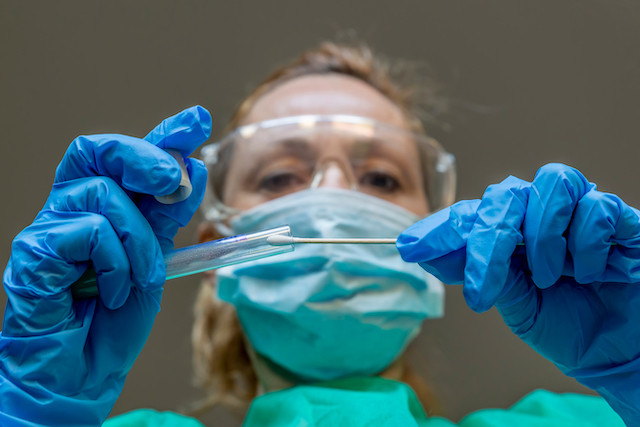At the height of the national mass screening project in July, Luxembourg had the capacity to test up to 20,000 people per day across 16 sites, in addition to the tests offered at private laboratories.
“We are conducting an active recruitment campaign but we are facing a twofold problem: the first is the lack of candidates,” Bionext Laboratories’ Dr Jean-Luc Dourson told Delano in September, adding: “The second problem we are facing is competition from the public sector, which is attracting our talent massively and against which we do not have the means to compete.”
HR shortage in lab sector
Bionext is responsible for conducting the free and voluntary airport testing programme, open since 29 May. And it is increasingly being solicited by private firms. “Many companies also contact us directly so that we can carry out on-site sampling for their employees,” Dr Dourson said.
The firm, which was founded in 2017, currently employs 170 full-time equivalent laboratory technicians, for the covid screenings but also for other non-covid related tests. “We have recruited about 20 people in the last few weeks and are still looking for medical staff, mainly nurse samplers and laboratory technicians,” Dr Dourson said, adding: “Unfortunately, there is a real shortage of human resources in our sector.”
According to Dr Dourson, his firm’s new recruits are from Luxembourg and the Greater Region, “mainly from France and Belgium”.
150% increase in healthcare jobs
According to recruitment site Moovitour, there has been a 150% increase in healthcare jobs in Luxembourg since May. “The priority needs tend to be fixed-term contracts offered by laboratories” in roles for sample takers, lab technicians and assistants and nurses, Florane Giolat of Moovijob told Delano in September.
A national multi-platform campaign resulted in the recruitment of some 265 testers and technicians, among them jobseekers, for the national testing programme, which was sub-contracted to the Laboratoires Réunis. Meanwhile, the number of nurses involved quadrupled from 20 on 26 May to 80 today. But is it enough to meet demand?
Useless tests
Responding to a parliamentary question last week, health minister Paulette Lenert (LSAP) confirmed the workload for laboratory staff was high as a result of the covid-19 diagnostic tests. Lenert said that additional strain was being placed on them because of patients requesting a test without a prescription.
“The health directorate has always discouraged this practice as it is of the opinion that such a test should be prescribed by a doctor who will first check the test as well.” She added that “unfortunately, many useless tests are being performed, for instance at the end of isolation for a covid-19 infection.” Lenert acknowledged the recruitment difficulties facing laboratories but her recommendation had been to prioritise certain analyses over others.
In September 2020, Luxembourg began the second phase of its large scale testing programme, conducting 53,000 tests per week, below the previous phase. The €60m programme prioritises testing of frontline workers in the health sector, education and university students, among others.
